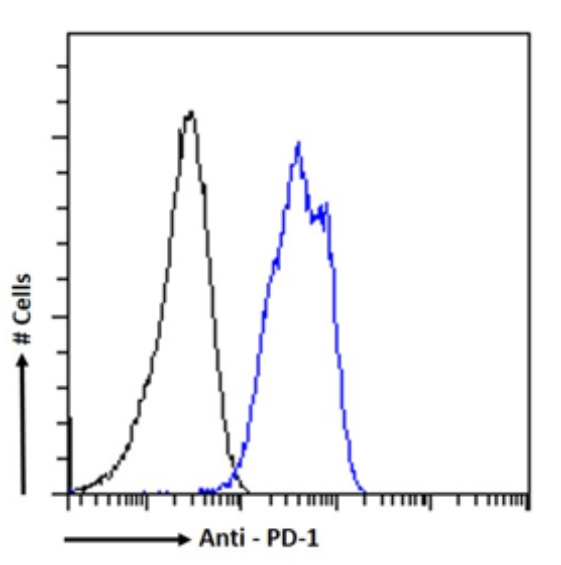Pdcd1 Rabbit Monoclonal Antibody [Clone ID: J43]
Other products for "Pdcd1"
Specifications
| Product Data | |
| Clone Name | J43 |
| Applications | ELISA, FC, IHC, IP, Neutralize |
| Reactivities | Mouse |
| Modifications | This chimeric rabbit antibody was made using the variable domain sequences of the original Hamster IgG format, for improved compatibility with existing reagents, assays and techniques. |
| Host | Rabbit |
| Clonality | Monoclonal |
| Immunogen | This antibody was raised by immunising Armenian hamsters with B12 cells, a PD-1 cDNA transfectant of BHK cells. |
| Specificity | This antibody is specific for murine PD-1. The specificity of this antibody has been confirmed in ELISA analysis, using PD-1 extracellular domain fusion proteins (Agata et al, 1996). Additionally, in flow cytometric analysis, this antibody reacts with PD-1 cDNA-transfected BHK and CHO cells, but not with parental BHK and CHO cells, as well as reacting with lymphocytes from PD-1 cDNA transgenic mice (Agata et al, 1996). This antibody has been used to immunoprecipitate PD-1 from lysates of PD-1 cDNA-transfected BHK and CHO cells (Agata et al, 1996), in flow cytometric quantification of CD4+PD-1+ T cells in murine spleens (Kasagi et al, 2010), and in immunohistochemical analysis of acetone-fixed murine spinal cord and brain tissue sections (Salama et al, 2003). This antibody displays diverse effects in different mouse models of disease. When administered to NZB/W F1 mice, a model of lupus-like nephritis, this antibody has been shown to delay the onset of nephritis and prolong survival, through the depletion of PD-1+ T cells (Kasagi et al, 2010). Antibody-treated NZB/W F1 mice displayed decreased numbers of PD-1+ T cells, and this antibody was confirmed to trigger complement-dependent cytotoxicity in PD-1+ T cells in vitro (Kasagi et al, 2010). Conversely, administration to experimental allergic encephalitis (EAE) and NOD diabetes mice exacerbated disease, through its neutralising activity (Salama et al, 2003; Ansari et al, 2003); this antibody has been shown in vitro to inhibit binding of both PD-L1-Ig and PD-L2-Ig to PD-1 transfected BHK cells (Ansari et al, 2003). |
| Formulation | PBS with 0.02% Proclin 300. |
| Concentration | lot specific |
| Conjugation | Unconjugated |
| Storage | Please store at 4°C for up to 3 months. For longer storage, aliquot and store at -20°C. Avoid freeze and thaw cycles. |
| Stability | 3 years from dispatch. |
| Gene Name | programmed cell death 1 |
| Database Link | |
| Synonyms | CD279; hPD-1; hPD-l; PD1; SLEB2 |
| Reference Data | |
Documents
| Product Manuals |
| FAQs |
| SDS |
{0} Product Review(s)
0 Product Review(s)
Submit review
Be the first one to submit a review
Product Citations
*Delivery time may vary from web posted schedule. Occasional delays may occur due to unforeseen
complexities in the preparation of your product. International customers may expect an additional 1-2 weeks
in shipping.






























































































































































































































































 Germany
Germany
 Japan
Japan
 United Kingdom
United Kingdom
 China
China




